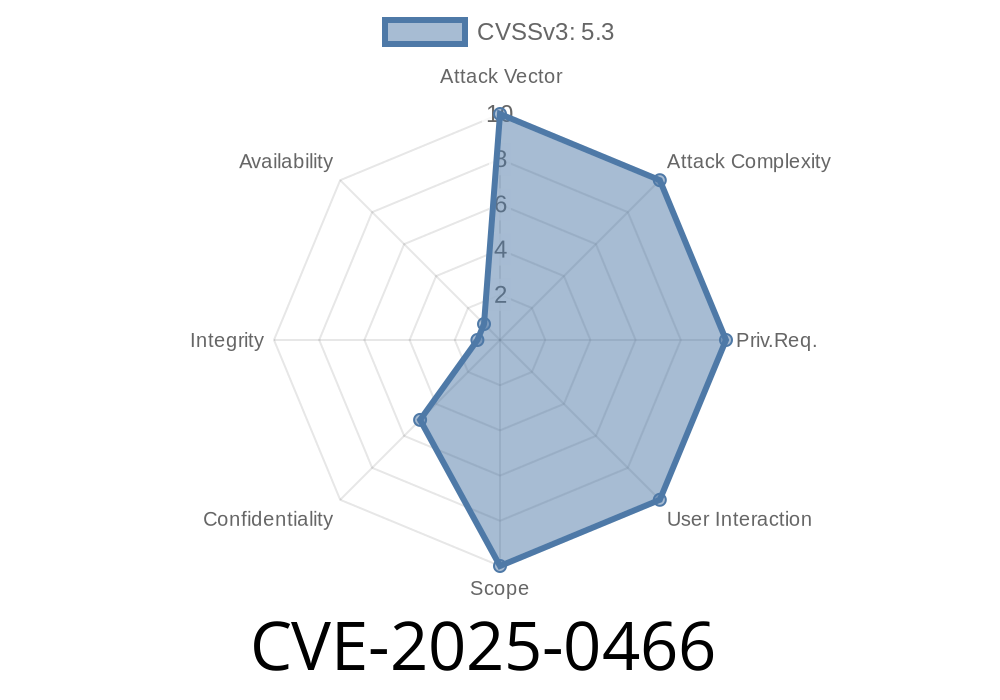WordPress powers much of the web. With so many sites relying on plugins, vulnerabilities can ripple through the ecosystem fast. Today, let’s talk about CVE-2025-0466, a real-world security bug found in the popular Sensei LMS plugin for WordPress. If you use Sensei LMS below version 4.24.4, you could be exposing sensitive information without even knowing it.
What is Sensei LMS and Why Does This Matter?
Sensei LMS is a major learning management plugin, used to create and manage online courses. Like many WordPress tools, it extends functionality through custom REST API routes—these are basically doorways for your web app and other software to interact with your WordPress site.
But here’s the problem: until version 4.24.4, some of those API routes weren’t properly locked down. The result? Anyone—even someone NOT logged in—can pull out user messages and emails from the system. That’s a privacy nightmare.
Vulnerable Versions: < 4.24.4
- CVE: CVE-2025-0466
How Does the Exploit Work?
Sensei LMS defines several REST API endpoints (URLs you can call) in PHP. These endpoints are supposed to handle messages and emails related to your LMS users. But some endpoints weren’t checking if a user was authenticated—or even logged into the website—before revealing sensitive details.
Here’s a simplified PHP snippet that demonstrates the core problem
// This is a simplified, illustrative example of vulnerable code in REST API registration
register_rest_route( 'sensei/v1', '/email/(?P<id>\d+)', array(
'methods' => WP_REST_Server::READABLE,
'callback' => 'get_sensei_email',
// Whoops. No 'permission_callback' means anyone can call this!
) );
function get_sensei_email( $request ) {
$id = $request->get_param('id');
// Directly returns email data (could include private correspondence)
return get_post_meta( $id, 'sensei_email', true );
}
Because there’s no permission_callback, WordPress doesn’t restrict access. Any random person can call this API and grab the data.
An attacker could just run something like
curl https://example.com/wp-json/sensei/v1/email/123
And get a user’s email contents meant for Sensei, or
curl https://example.com/wp-json/sensei/v1/message/456
User messages: Internal communications between students and instructors
This could leak private discussions, grade information, or any sensitive info handled via the plugin’s email/message system.
Original References
- Official Changelog for Sensei LMS
- WordPress.org Plugin Page
- NVD Entry for CVE-2025-0466
- Patch Details on GitHub (Sensei LMS repo, commit 4.24.4)
- Wordfence Advisory
How Was It Fixed?
The maintainers patched this issue in version 4.24.4 by properly locking down the affected routes. Here’s what secure code looks like:
register_rest_route( 'sensei/v1', '/email/(?P<id>\d+)', array(
'methods' => WP_REST_Server::READABLE,
'callback' => 'get_sensei_email',
'permission_callback' => function( $request ) {
// Only allow logged-in users with the right privileges
return current_user_can('manage_sensei_emails');
}
) );
With this in place, only authenticated users with the required capabilities can access those endpoints.
Restrict REST API access
Use plugins like Disable REST API if you don’t need it. Or lock down access to trusted users.
Monitor for suspicious REST API calls
Uses tools like Wordfence or WP fail2ban.
The Big Picture
CVE-2025-0466 is a textbook example of the importance of authenticating every action in your web APIs. Even a widely-used, professionally developed plugin can overshare data if routes aren’t locked down.
If you’re running Sensei LMS, update now. If you build WordPress plugins, double-check your REST API permissions!
References & Further Reading
- Official Changelog
- WordPress Plugin Vulnerability Database listing
- NVD CVE-2025-0466
- Wordfence coverage for Sensei LMS REST API Info Leak
Timeline
Published on: 02/04/2025 06:15:30 UTC
Last modified on: 02/04/2025 19:15:32 UTC
